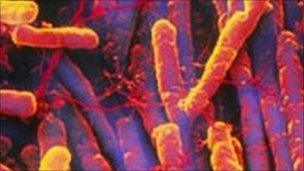C. difficile inquiry finds superbug linked to 31 deaths
- Published
Northern Ireland Health Minister Michael McGimpsey has apologised to those affected by the C. difficile outbreak in Northern Trust hospitals.
A £2m public inquiry, external into the outbreak of the superbug has concluded it was linked to 31 deaths.
The inquiry found it was the underlying cause in 15 deaths and a contributory cause in 16 from 2007-2008.
The report, which sets out 12 recommendations, is highly critical of some of the trust's practices.
On Monday, Mr McGimpsey told the NI Assembly: "The inquiry report includes a number of positive comments, showing that high-quality care was provided in many instances and in many wards.
"However, it is clear that in some areas things happened which fell short of the standard of care that people have a right to expect."
"I accept all of the recommendations in this report and I will require health and social care trusts across Northern Ireland to carefully consider the implications for their own services and to ensure they implement them."
He said over the last three years C. difficile cases had been halved in Northern Ireland.
The remit of the inquiry, which was headed by Dame Deirdre Hine, was not to apportion blame, but to look at the experiences of those affected by the outbreak.
However it was particularly critical of the Northern Trust's communication systems and described them as "inadequate."
It also identified weaknesses in some of the management systems and said the panel failed to understand why some problems, including the isolation facilities in the A & E were not resolved more quickly.
The report recommended that where possible, patients should be nursed in single rooms and that patients who contract C. diff are told of the diagnosis.
The report also said that the traumatic experience of C. diff, compounded by the failures in communication and care, has for some families lasted well beyond the date when the outbreak was officially declared over.
Dame Deirdre said: "While we have been rightly critical of the systems of the trust, we have not lost sight of the fundamental cause of the outbreak which led to this Inquiry - it was C. difficile itself.
"We know that C. difficile presents a constant challenge for all those who strive to combat its effects and its spread.
"The patients whom it infected in this outbreak, as in others we have studied, were mainly old, frail, already suffering from other serious medical conditions and had recently taken antibiotic drugs."
In October, the inquiry heard from families whose loved ones had died after contracting the hospital superbug and Dame Deirdre expressed her condolences to them.
The report is the first official acknowledgment of the dozens of civil claims made by families.
Dame Deirdre said she hoped the inquiry had removed for the bereaved some uncertainties about the part played by C. difficile infection in the deaths of those who died.
"It has provided an opportunity for patients, staff and relatives to describe their experiences and the panel has heard expressions of satisfaction from some relatives, both that their voices were heard, and that they now have a clearer understanding of the disease.

An image of clostridium difficile
"For the majority of those who gave evidence their aim, like ours, has not been to attribute blame but to ensure that, as far as is humanly possible, others do not suffer the same distressing experiences as they or their loved ones have done."
At the inquiry, the panel heard that senior management knew about the outbreak five months before it was officially declared.
In her report Dame Deirdre said C. diff attacked at a time when the Northern Health and Social Care Trust was in a vulnerable state having recently undergone major reorganisation.
"This explains, to some extent, why systems and practices in the trust, in particular those relating to communication, that should have operated to minimise the distressing experiences of the patients who caught the infection, either during their hospital stay or before their admission, were, as demonstrated by the evidence we were given, less than adequate."
Dame Deirdre said she acknowledged that much had changed since the end of the outbreak.
"Many of these systems, for example those of environmental cleaning, have been radically changed and improved," she said.
In a statement, Northern Trust chief executive Sean Donaghy said he "would like to unreservedly apologise to everyone affected by the C. difficile outbreak".
"On behalf of the trust board, I fully accept the recommendations of this public inquiry," he said.
"It is clear that for some patients, aspects of their care did not reach the standard expected by the trust.
"We have learned from their experience and we have taken action to make improvements."
- Published20 October 2010
- Published15 October 2010
- Published13 October 2010
- Published4 October 2010
- Published4 October 2010